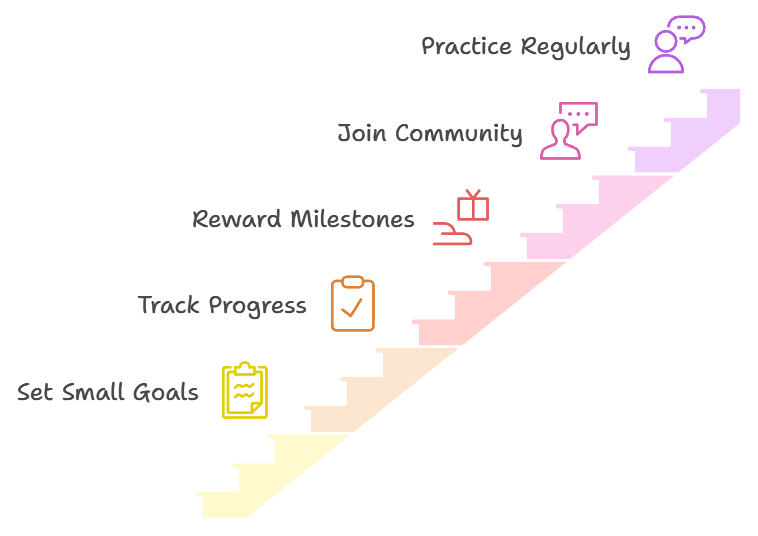A Comprehensive Guide to Learning French for Beginners: Master the Basics in 2025
Learning French opens doors to a world of opportunities, from enhancing your career prospects to deepening your cultural understanding. Whether you’re planning a trip to Paris or aiming to expand your linguistic horizons, this guide will set you on the path to French fluency.
Key Takeaways
- French learning requires 3-6 months for basic conversation skills
- Regular practice of 30 minutes daily yields better results than longer, irregular sessions
- Cultural immersion and technology-aided learning accelerate progress
- Understanding French etiquette is as important as language skills
- Starting with pronunciation fundamentals prevents bad habits
Getting Started with French
The journey to French fluency begins with understanding where you’re headed. The Common European Framework of Reference (CEFR) provides a clear roadmap from A1 (beginner) to C2 (mastery). For most beginners, reaching A2 level takes about 6 months of consistent study.
Learning Path Structure
| CEFR Level | Time Required | Skills Achieved | Daily Practice |
|---|---|---|---|
| A1 | 3 months | Basic phrases, simple conversations | 30 minutes |
| A2 | 6 months | Daily situations, short exchanges | 45 minutes |
| B1 | 12 months | Complex conversations, opinions | 1 hour |
| B2 | 18-24 months | Professional contexts, nuanced expression | 1-2 hours |
Essential Tools and Modern Learning Methods
Today’s French learners have unprecedented access to technology-aided learning tools. AI-powered platforms like Duolingo and Babbel offer personalized learning experiences, while virtual reality programs provide immersive environments for practice.
Key modern learning tools include:
- Language exchange apps for real conversation practice
- VR immersion programs for cultural experience
- AI pronunciation coaches
- Social media communities for peer learning
- Podcast series for passive learning
Cultural Integration and Etiquette
One often overlooked aspect of French learning is cultural competency. Understanding French social norms dramatically improves your ability to communicate effectively.
Essential French Etiquette Rules
- Always use “Bonjour” before any interaction
- Maintain formal address (vous) until invited to use informal (tu)
- Keep hand gestures minimal during conversation
- Respect meal times and social boundaries
Practical Application Strategies
Real-world application is crucial for language retention. Here’s how to integrate French into your daily life:
Morning Routine:
- Label household items in French
- Listen to French news during breakfast
- Practice daily expressions while getting ready
Work/Study Time:
- Set your phone language to French
- Take notes in French
- Join online French discussion groups
Evening Activities:
- Watch French movies with subtitles
- Participate in virtual language exchange
- Review the day’s learning points
Common Challenges and Solutions
Many beginners face similar obstacles when learning French. Here’s how to overcome them:
Pronunciation Challenges
French pronunciation can be tricky for English speakers. Focus on these key areas:
- Nasal sounds (an, en, in, on)
- Silent letters at word endings
- Liaison between words
- Proper stress patterns
Motivation Maintenance
Staying motivated is crucial for long-term success. Try these proven strategies:
- Set small, achievable weekly goals
- Track progress with a learning journal
- Reward yourself for reaching milestones
- Join a French learning community
- Practice with native speakers regularly

Regional Variations and Specializations
French isn’t just spoken in France. Understanding regional variations enriches your learning experience:
French Variations Table:
| Region | Key Differences | Special Vocabulary |
|---|---|---|
| Quebec | Distinct accent, preserved old French words | Different slang, English influence |
| Belgium | Unique numbers system, different pronunciation | Local expressions |
| Switzerland | German influence, slower pace | Administrative terms |
| African French | Varied accents, local vocabulary | Cultural-specific terms |
Progress Assessment and Next Steps
Regular self-assessment helps maintain momentum. Consider these evaluation methods:
- Monthly recording of conversations
- Online proficiency tests
- Writing journal entries
- Vocabulary retention checks
- Grammar accuracy tracking
Remember, learning French is a journey, not a race. Focus on consistent progress rather than perfect performance. With dedication and the right tools, you’ll be speaking French confidently sooner than you think.
Pro Tip: Start with high-frequency words and phrases that make up 80% of daily conversations. This approach gives you practical communication skills faster than traditional textbook methods.
By following this comprehensive approach and utilizing modern tools while respecting traditional learning methods, you’ll build a solid foundation in French. Remember to embrace the culture along with the language, and don’t hesitate to make mistakes – they’re an essential part of the learning process.
